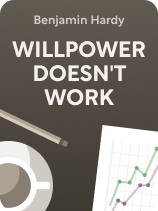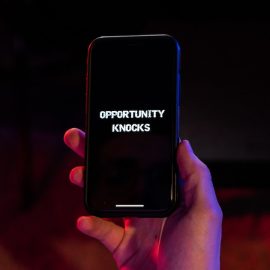

This article is an excerpt from the Shortform book guide to "Willpower Doesn't Work" by Benjamin Hardy. Shortform has the world's best summaries and analyses of books you should be reading.
Like this article? Sign up for a free trial here.
Why does willpower seem to fail us so often? Is there a better way to achieve our goals?
Benjamin Hardy challenges the common belief that willpower is the key to success. He proposes that our environment plays a crucial role in shaping our behavior and outcomes. Instead of relying on willpower alone, Hardy suggests designing our surroundings to support our goals.
Discover why willpower doesn’t work, and learn why certain environments can naturally lead you to success.
Why Willpower Doesn’t Work
Hardy begins by explaining that many people think of willpower like a muscle: the more you use it, the stronger it gets. Therefore, they believe that the way to accomplish anything—from landing your dream job, to losing weight, to overcoming addiction—is to work hard and keep training your discipline. Also, the main reason people give for falling short of their goals is a lack of willpower. But, Hardy challenges this notion and goes on to make a case for why willpower doesn’t work.
(Shortform note: Hardy discusses willpower at length, but he never explicitly defines it. Willpower is the ability to control yourself; to choose a course of action and follow through on it, even if it’s difficult or unpleasant. For example, sticking to a diet is often seen as an act of willpower, as is working hard at a stressful job. Determination, discipline, and self-control are common synonyms for willpower.)
Hardy says that willpower is actually a very weak “muscle”; no matter how hard you work, there’s only so much it can do. Furthermore, modern life all but ensures that your willpower is permanently exhausted. Every day, starting from the moment you wake up, you’re bombarded with decisions: what to wear, what to eat, what to watch or listen to while you get ready, and so on. You’re also constantly fighting against countless temptations, such as time-wasting social media feeds and smartphone games, junk food, and alcohol and other drugs, just to name a few.
In short, trying to create the life you want through pure willpower is almost sure to fail, and that’s not your fault.
(Shortform note: Many mental health experts—including Hardy himself—agree that willpower can be learned and strengthened with practice. Where Hardy differs from his peers is his argument that willpower is limited. The more common belief is that willpower has no limits, meaning that people can remain in control no matter what situation they’re in or how mentally exhausted they are. To extend the “willpower is like a muscle” idea, Hardy is saying that willpower is really like the muscles in your pinkie finger: You can strengthen those muscles to some extent with the right exercises, but no matter how much you train, you’ll never be able to lift heavy weights with just your pinkie.)
The Solution: Design Environments That Force You to Succeed
If you can’t rely on willpower, how do you achieve your goals?
Hardy says the key is to create an environment that forces you to become the person you want to be. This is a better approach because, while humans aren’t as strong-willed as we like to think, we are excellent at adapting to our environments. We’re also uniquely good at changing our environments; adapting our surroundings to meet our needs. Therefore, Hardy says that you can accomplish anything by using these two natural strengths in tandem.
In short, you can intentionally adapt your environment in ways that, in turn, force you to adapt. To give a simple example, you could try leaving your cell phone charger at work. This tactic would strictly limit how much time you spend on your phone at home, with no willpower needed on your part; your phone’s battery would set a hard limit on how much you can use it.
(Shortform note: The idea that willpower is unreliable goes against the popular belief that you can achieve anything through discipline and determination. However, some other recent theories are even more extreme: For instance, neurologist Robert Sapolsky thinks willpower doesn’t even exist. According to Sapolsky, free will—which includes willpower—is an illusion, and any given action is the result of countless genetic and environmental influences all coming together into a single, inevitable outcome. However, whether Sapolsky or Hardy are right about this topic, the conclusion is the same: Stop trusting in willpower, and instead redesign your environment to push you toward the life you want.)
Create a Work Environment and a Rest Environment
Hardy adds that it’s actually best to create two different environments for yourself: one for working and one for resting. This is important because you’ll struggle to be productive in a place that you associate with rest and relaxation, such as your bedroom or living room. Entering those places cues your brain that it’s time to relax and unwind, and forcing yourself to be productive under those circumstances takes a lot of willpower.
The reverse is also true, meaning you won’t rest as effectively in a place that you associate with work and stress. For that reason, Hardy doesn’t suggest working from home: The mismatch between your environment (a place you use for work) and your goal (to stop thinking about work so you can rest) will distract you, so you won’t be able to fully enjoy your rest time.
(Shortform note: Willpower Doesn’t Work was first published in 2018, shortly before the Covid-19 pandemic forced millions of people all over the world to start working remotely. Since then, studies have found—contrary to what Hardy writes—that people are significantly happier when they work from home. The research on productivity is less clear: Some studies have found that people are more productive when they work remotely, while others have found the opposite. Ongoing debates about the methodologies of those studies—as well as debate over what “productivity” actually means—suggest that a clear consensus on that topic could still be a long way off.)

———End of Preview———
Like what you just read? Read the rest of the world's best book summary and analysis of Benjamin Hardy's "Willpower Doesn't Work" at Shortform.
Here's what you'll find in our full Willpower Doesn't Work summary:
- Why you can’t just “will” your way to success
- Practical ways to optimize your working and resting environments
- How you can make reaching your goals inevitable






